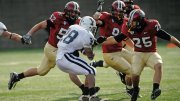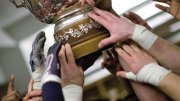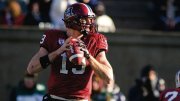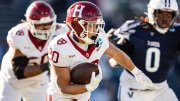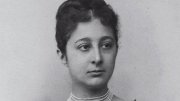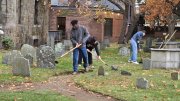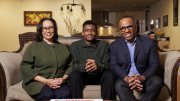Arctic conditions prevailed at Harvard Stadium on November 22, and so did the home team. With a titanic defensive performance, Harvard shut out Yale, 10-0, topping off a 9-1 season and securing a share of the Ivy League championship.
Harvard won the Ivy trophy a year ago and shares the 2008 title with Brown. The Bruins had narrowly defeated the Crimson, 24-22, in the teams’ first league game of the season (see “Bumps in the Road,” November-December 2008, page 78). Were it not for a 13-3 loss to Yale in early November, Brown would have gone unbeaten in the league and won the Ivy title outright—so Harvard owes the Eli a debt of gratitude.
Seven of the last eight matchups with Yale have gone Harvard’s way. Not since its teams won eight of nine games played from 1912 to 1922 has the Crimson enjoyed such dominance.
Swirling winds and frozen turf limited both sides’ passing attacks and played hob with kicks, making it likely that the team with the best ground game and strongest defense would win the 125th Harvard-Yale game. That could have been Yale, with an offense built around record-setting tailback Mike McLeod, and with the top-ranked defense against scoring in all of Division 1-AA. But Harvard had the upper hand from the start. After taking the opening kickoff, the Crimson offense moved downfield on a series of handoffs to sophomore back Gino Gordon, fronted by a hard-hitting interior line. Midway through the first quarter, Gordon scored the game’s sole touchdown after an Eli back misplayed a windblown punt and junior cornerback Derrick Barker fell on the ball at the Yale 13-yard line. The touchdown was the first given up by the Yale defense in more than 10 quarters of play. Sophomore Patrick Long’s point-after gave the Crimson a 7-0 lead.
Harvard then sprang an onside kick, recovered the ball, and mounted a drive that ended with a missed field goal try. By the time Yale took its first snap, the Crimson offense had run 24 plays, and more than 11 minutes had elapsed.
Yale had a clear scoring chance in the second quarter, set up by McLeod’s 11-yard run, his longest of the day. But with the ball on the Harvard three-yard line, Yale’s kicker hooked a 20-yard field goal attempt. Harvard then forced a midfield fumble and drove to the Yale 12-yard line. With two seconds left in the half, Long came on for another field goal try, but his kick was deflected.
Harvard had held Yale to 80 yards of total offense in the game’s first half, with McLeod accounting for 50 of those yards. The Crimson defenders amped it up in the second half, allowing only a net 10 yards of total offense. McLeod, who had broken every major Yale rushing record in four years as a starter, gained just 12 yards on seven carries, and was held to minus-two yards in the fourth quarter.
At the start of the final period, an 11-yard run by Gordon set up Harvard’s second and last score, a 23-yard, into-the-wind field goal by Long.
The Bulldogs got one last scoring chance with four minutes to play. Sophomore back Gio Christodoulou, whose 87-yard punt return had netted Yale’s only points in the 2007 game, fielded a punt at his own 44 and sped down the sideline. Harvard’s Derrick Barker caught him at the eight-yard line, saving a touchdown. The defense held for three plays, only to have a pass-interference penalty give Yale a first-and-goal at the two. Another pass attempt misfired, and on the next snap Harvard ran an all-out blitz. Linebacker Eric Schultz got a solid hit on quarterback Hart, the ball came loose, and tackle Carl Ehrlich pounced on it. With two minutes to go, Harvard ran out the clock.
Gordon ended the day with 168 yards rushing on 39 carries, both career highs. All-Ivy quarterback Chris Pizzotti ’08 (’09), the mainspring of the offense for two and a half seasons, completed 12 of 21 passes for 109 yards, and rushed for another 74 yards on 16 carries. Harvard had 370 yards of total offense to Yale’s 90, and ran 79 plays against 40 for Yale. McLeod gained 62 yards on 21 carries, while Eli quarterback Brook Hart completed 4 of 11 passes for 36 yards.
Game-saving bailouts had been a defensive specialty. Another forced fumble had preserved a 27-24 win over Patriot League rival Lehigh at the Stadium in October. A late drive had brought the visitors to Harvard’s 14-yard line. With a first down and 46 seconds to play, quarterback J. B. Clark set up to pass, then lit out for the goal-line. Defensive end Peter Ajayi managed to grab the back of Clark’s jersey, and the ball flew into the hands of linebacker Glenn Dorris. Game over.
In a rain-soaked battle at Princeton a fortnight later, the defense quashed a late-game rally when blitzing linebackers Dorris and Schultz threw the Tiger quarterback for a 13-yard loss. Harvard left town with a 24-20 win.
A week before the Yale game, Harvard’s escape artists did it again at Penn’s Franklin Field. With the Quakers threatening at the Crimson 12-yard line and 10 seconds to play, cornerback Ryan Barnes came up with his third pass interception of the day to save a 24-21 victory.
Team captain Matt Curtis, a tackle, had trailed Schultz and Ehrlich on that last defensive hit of the Yale game. After the play, the Stadium’s new jumbotron scoreboard showed Curtis and Ehrlich, his Pforzheimer House roommate, in a giddy sideline hug. “Carl had the ball,” Curtis said later. “I ran to Carl and I wouldn’t let him go, and he wouldn’t let go of the ball. I told him how much I loved him and how this was the only way for it to end. It was just amazing to have my last play in a Harvard uniform be of that caliber, with my two best friends.”
Curtis earned an H as a freshman and over the next three seasons played almost every defensive minute of every game. An all-state player at Lynn English (Massachusetts) High School, he applied to Harvard with an admissions profile that set him apart. Both parents had struggled with drug and alcohol abuse, ending the marriage when Curtis was two. He and his older sisters and brother grew up in poverty, living in public housing and sometimes subsisting on Salvation Army handouts. “Most kids hated school,” Curtis would recall. “I loved it. It was warm, they had heat, and they fed me.”
His father died of cancer before Curtis’s senior year at Lynn English. His mother remained drug-addicted. With tutoring, Curtis raised his SAT scores by 300 points and was accepted at Harvard. Though he needed coaching on tying a necktie when he arrived, he found the transition easy, in part because of the friendliness of the football squad: “I had 110 brothers in the locker room every single day.” On the field, Curtis was in his element. Linemate Peter Ajayi saw him as “the quintessential football player, someone you notice immediately for his speed and strength. Any play he can possibly make, you know he’s going to be there.”
Curtis made the all-Ivy second team in 2006 and was a first-team selection in his junior and senior years. Despite being double-teamed by blockers on almost every play this season, he ranked second in the league in tackles-for-loss.
What did Curtis read into his team’s shutout of Yale? “If you’d showed me the statistics at the beginning of the game, I’d have thought it would have been more like last year,” he said afterward. “But Yale’s an amazing team, very tough. Right down to the last second, they were fighting.”
At Yale Bowl a year earlier, Harvard had blown out a previously undefeated Eli squad, 37-6. Aside from the obvious scoring differential, Curtis had a point: the defensive statistics for both games were much alike, and even a bit more one-sided this time. In 2007 Yale had the ball for 22:01 minutes, against 20:45 in 2008. The Blue was held to 66 yards rushing and 43 in the air a year ago, against 54 yards and 36 yards a year later. Yale made six first downs in 2007, five in 2008. It didn’t lose a fumble in the 2007 game, but lost three this time. Never in the modern history of the Harvard-Yale series have the sons of Walter Camp had their clocks cleaned so thoroughly in consecutive games.
Tidbits: Quarterback Chris Pizzotti was selected by the league’s eight head coaches as the Ivy player of the year. The fifth-year senior, whose strong right arm helped Harvard to consecutive championships, was one of seven Crimson players named to the all-Ivy first team. For the second year, Pizzotti received the Crocker Award as the team’s most valuable player.
Armed and dangerous: Pizzotti finished with impressive career statistics. He passed for 5,675 yards, had 427 pass completions, and threw 37 touchdown passes. The only Crimson quarterback to put up bigger numbers has been Neil Rose ’03 (5,949 yards, 455 completions, 41 touchdown passes).…Harvard won 20 of the 21 games that Pizzotti started and finished.
Aerial circus: Pizzotti threw 17 touchdown passes this season, five of them covering more than 50 yards.…Junior Matt Luft led Harvard’s receivers with 54 catches for 914 yards and five touchdowns. He had more than 100 receiving yards in five of his games.…In the Columbia game Luft caught six passes for 110 yards and a touchdown, while sophomore Levi Richards made seven receptions for 103 yards and two scores. Harvard hadn’t had two 100-yard receivers in a game since November 1975.
On call: Liam O’Hagan, an honorable-mention all-Ivy quarterback in his sophomore year, missed most of the 2007 season with an injury and was granted a fifth year of eligibility this season. He saw spot duty in goal-line situations and on kicking teams.…With Harvard leading Dartmouth 26-0, O’Hagan stepped in at quarterback under orders to run the ball. He picked up 66 yards on his own, and the offense closed out a 368-yard rushing day with 32 consecutive running plays—a sequence perhaps unmatched since the legalization of forward passing in 1906.
It’s up, it’s good: Patrick Long’s field goal in the Yale game was his thirteenth of the season, tying a single-season record shared by Charlie Brickley ’15 (1912) and Matt Schindel ’08 (2004). His 45-yarder at Lafayette was Harvard’s longest since the 1993 season.
House of horrors: The 24-21 win over Penn was Harvard’s fourth in five years, but only its second at Franklin Field since 1980.…Though first place was at stake, the game drew only 7,352 spectators.
Hot ticket, cold day: The Yale game was a Stadium sellout, as it has been each year since 1998. Official attendance was 31,398. …Yale hadn’t been blanked by Harvard since 1992, nor shut out by anyone since 1997.…Four days later, Jack Siedlecki retired as coach. He’ll remain at Yale as an assistant director of athletics. Siedlecki, 57, had a record of 70-49 over 12 seasons; he was 4-8 against Harvard.
Laurels: Since the start of formal Ivy League play in 1956, Harvard has won six outright championships and shared the title seven times. The most recent back-to-back championships came in 1982–83.
Streak: Crimson teams have won seven or more games in each of the past eight seasons—an Ivy League record, and Harvard’s best eight-year run since 1903–1910.
Honors: Joining Chris Pizzotti on the all-Ivy first team were captain and defensive tackle Matt Curtis ’09, cornerback Andrew Berry ’09, linebackers Glenn Dorris ’09 and Eric Schultz ’09, offensive tackle James Williams ’10, and receiver Matt Luft ’10. Freshman defensive back Matt Hanson was named Ivy rookie of the year.…Defensive tackle Carl Ehrlich, of Bethesda, Maryland, and Pforzheimer House, will captain the 2009 squad.
Viva voce: Noah Van Niel ’08, the versatile fullback of the 2007 team, returned to the Stadium to sing the national anthem before the Yale game. A tenor, he is currently training for an operatic career at Philadelphia’s Academy of Vocal Arts. You may never hear the anthem sung better at a sports event.
